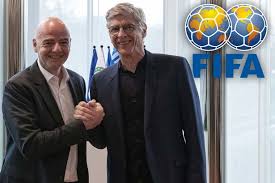By Andrew Warshaw
When Tottenham Hotspur lifted the Europa League trophy in Bilbao on Wednesday to end the club’s 41-year quest for European silverware, penny for the thoughts of a certain Arsene Wenger.
Wenger, head of football development at FIFA, had denounced the rule that the winner of Europe’s second-ranked club competition automatically qualifies for the Champions League.
Despite the fact he conveniently ignored that the UEFA-imposed regulation has been in place for a decade and has nothing to do with FIFA, it may be too much of a stretch to suggest Wenger had Tottenham in mind when he decided to speak out a couple of weeks before the final. Because of course, before he went to work for Gianni Infantino, he was manager of Tottenham’s bitter rivals Arsenal for more than 20 largely successful years.
Who knows whether the prospect of Spurs joining Arsenal in the Champions League was too unpalatable for the Arsenal managerial legend to stomach. But in attacking UEFA’s rules in the way that he did, Wenger served only to widen the divisions between world football’s governing body and its most influential single confederation.
And the tensions between the two parties did not stop there. Ten days later, as has been well chronicled on this website, several of Europe’s football leaders, including UEFA president Aleksander Ceferin, walked out of the FIFA congress in Paraguay accusing Infantino of prioritising “private political interests” after he turned up late following his Middle East trip with US President Donald Trump.
The Europeans were unhappy with Infantino’s opportunism by cosying up to Trump instead of making sure his own Congress began on time.
Not for the first time, there seems to have been one rule for the FIFA president and one for everyone else. Infantino does not take kindly when he doesn’t get his own way. Nor, as we know, does the present incumbent of the White House. Perhaps that’s one reason why they seem to get along so well. Imagine Infantino’s reaction if the boot had been on the other foot, so to speak, and any of his senior minions had behaved in a similar way.
But back to my first point. It’s common knowledge that the respective heirarchies of FIFA and UEFA do not always see eye to eye so what on earth was Arsene Wenger doing in deciding to denigrate a UEFA rule that has been around for years? Maybe because this year’s final was between two English clubs from a league that already has its fair share of Champions league participation.
In that respect Wenger, like everyone else, is entitled to his opinion. And agreed it doesn’t look great, given their disastrous domestic league campaign, that Tottenham’s reward for winning the Europa League is to play Champions League football next season. The same reward incidentally that Manchester United, whose domestic campaign has been equally abysmal, would have enjoyed had they been victorious in Bilbao.
But that’s not UEFA’s fault. They had no idea who would reach the final or lift the trophy so it might have been more prudent for Wenger, particularly given his previous job, to keep his counsel on an issue that does not directly affect his own organisation.
Besides, Wenger himself is hardly immune from coming out with debatable suggestions. Staging the World Cup every two years immediately springs to mind – a ridiculous initiative that was quickly knocked back.
As for Tottenham’s Europa League triumph itself, the sight of thousands of jubilant fans celebrating long into the night and returning from Bilbao, bleary-eyed but ecstatic, the next day said everything about what winning their first major trophy for 17 years meant, regardless of a largely forgettable spectacle for the neutral.
Yet even as the players staged a victory parade today in front of thousands of euphoric supporters, that same word – division – was lurking just below the surface. This time, over the position of Spurs coach Ange Postecoglou with the fanbase seemingly split down the middle.
How can Tottenham possibly keep faith with Postecoglou after the club’s lowest, or at best second lowest, finish in the Premier League era and the humiliating possibility of ending up just one place above the relegation zone.
That’s one totally justifiable argument being bandied about. The other, equally justifiable, is how can Postecoglou possibly be sacked after he delivered what a string of bigger-name predecessors had failed to achieve? It was exactly what he promised and what the supporters had long been craving.
Of all the tough managerial calls made by the Spurs board led by notoriously hardball chairman Daniel Levy in recent years, this surely has to be the toughest.
Andrew Warshaw is chief correspondent of Insideworldfootball and was formerly Sports Editor of the European. Rumours of his retirement are slightly exaggerated. Contact him at moc.l1752057657labto1752057657ofdlr1752057657owedi1752057657sni@w1752057657ahsra1752057657w.wer1752057657dna1752057657
